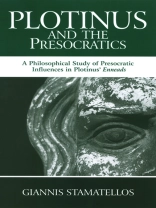Filling the void in the current scholarship, Giannis Stamatellos provides the first book-length study of the Presocratic influences in Plotinus’ Enneads. Widely regarded as the founder of Neoplatonism, Plotinus (204–270 AD) assimilated eight centuries of Greek thought into his work. In this book Stamatellos focuses on eminent Presocratic thinkers who are significant in Plotinus’ thought, including Heraclitus, Parmenides, Empedocles, Anaxagoras, the early Pythagoreans, and the early Atomists. The Presocratic references found in the Enneads are studied in connection with Plotinus’ fundamental theories of the One and the unity of being, intellect and the structure of the intelligible world, the nature of eternity and time, the formation of the material world, and the nature of the ensouled body. Stamatellos concludes that, contrary to modern scholarship’s dismissal of Presocratic influence in the Enneads, Presocratic philosophy is in fact an important source for Plotinus, which he recognized as valuable in its own right and adapted for key topics in his thought.
Tabla de materias
Acknowledgments
Introduction
1. The Origins of Plotinus’ Philosophy
1.1 Plotinus’ Predecessors
1.2 Plotinus’ Philosophical Method
1.2.1 Lectures and Writings
1.2.2 Language, Simile, and Metaphor
1.2.3 Quoting Predecessors
1.3 Plotinus’ Philosophical Sources
1.3.1 Plato
1.3.2 Aristotle
1.3.3 Stoics and Epicureans
1.3.4 Middle-Platonists, Aristotelians, and Neopythagoreans
1.3.5 Gnostics, Christians, the Orient, and other Contemporary Movements
1.4 Plotinus and the Presocratics
2.1 The One in Plotinus
2.2 The Presocratic One in the Enneads
2.3 Parmenides’ Monism
2.4 The Ineffable One
2.4.1 The Apophatism of the First Principle
2.4.2 The Pythagorean Apophatism of the Monad
2.5 The One as First Principle
2.5.1 Heraclitus’ One
2.5.2 Empedocles’ Philia
2.5.3 Anaxagoras’ Mind
3.1 Plotinus’ Theory of Intellect
3.2 Eleatic Being in the Enneads
3.3 The Nature of Being
3.3.1 Parmenides’ Theory of Being
3.3.2 Plotinus on Parmenides’ Being
3.3.3 Thinking and Being
3.4 The Predicates of Being
3.4.1 Ungenerated and Indestructible
3.4.2 Indivisible and Self-identical
3.4.3 Imperturbable and Changeless
4.1 Plotinus’ Theory of Eternity and Time
4.2 Eternity and Time in the Presocratics
4.3 The Presocratic Theories of Eternity and Time in the Enneads
4.4 The Timelessness of Being
4.4.1 Philolaus’ Eternal Continuance and Plato’s Eternity of the Forms
4.4.2 Parmenides’ Timelessness of Being
4.4.3 Plotinus’ Timelessness of Eternity
4.5 The Eternal Life of Intellect
4.5.1 Eternity in Heraclitus
4.5.2 Eternal Life in Empedocles
4.6 The Everlastingness of Time
4.6.1 The Myth of Time
4.6.2 The Everlastingness of the Cosmos
4.6.3 The Movement of the Spheres, Eternal Recurrence, and Spiral Time
5.1 Matter and Ensouled Body in Plotinus
5.2 Plotinus’ Criticism of Presocratic Matter
5.2.1 Anaximander’s apeiron
5.2.2 Empedocles’ Theory of the Four Elements
5.2.3 Anaxagoras’ Theory of Matter
5.2.4 The Atomic Theory of Matter
5.3 Plotinus’ Theory of the Ensouled Body
5.3.1 The Presocratic Theories of the Ensouled Body in the Enneads
5.3.2 Heraclitus’ Theory of Soul and Physical Alteration
5.3.3 The daimo¯n in Empedocles
Appendix. Text of Presocratic Fragments in Plotinus’ Enneads
Notes
Bibliography
Index Fontium
Index of Concepts and Proper Names
Sobre el autor
Giannis Stamatellos is Instructor of Ancient Greek Philosophy at New York College in Athens, Greece.












